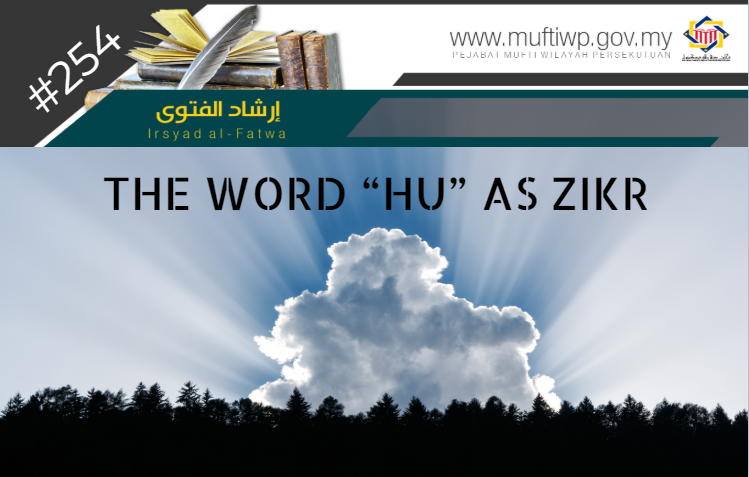Question:
Assalamualaikum ustaz. Can ustaz explain: Is there any zikr that sounds as هو? Because as far as I know, the word هو means ‘he’. Hope to get an explanation from ustaz?
Answer:
Alhamdulillah, praise and thanks to Allah for the countless blessings He has blessed us all with. Blessings and salutations to the Prophet Muhammad PBUH, his wives, his family, companions and all those that follow his teachings to the day of judgement.
Zikr is a pure term from Allah. Syeikh Abdul Rahman al-Sa’di defines zikr in general includes anything that can bring a slave closer to Allah SWT in terms of aqidah, thoughts, worship in the heart, physical acts or praises to Allah or the study of beneficial things or teaching of beneficial things and others. (See: Al-Riyadh al-Nadhirah, pg. 245)
Specifically, zikr refers to certain phrases or words that has been sanctioned by Allah SWT such as reciting the Quran, reciting of His names or His attributes within the heart or aloud as stated in the Quran or phrases that the Prophet PBUH sanctioned with the meaning of praising, purifying, sanctification and glorifying the oneness of Allah SWT. (See: Al-Zikr wa Atharuh fi Dunya al-Muslim wa Akhiratih, pg. 17-20). Ibnu ‘Allan concludes zikr as any form of worship from phrases or words specified by what has been sanctioned (by Allah SWT), aiming to glorify and praise Allah SWT. (See: al-Futuhat al-Rabbaniyyah Syarh al-Azkar al-Nawawiyyah, 1/396)
This means, zikr is basically encouraged and sanctioned in Islam. There are several verses in the Quran that state the commands asking us to do zikr to Allah SWT. There are several commands that said that it is obligatory to zikr or remembering Allah in the form of the obligatory five times prayer in surah Toha verse 14, Allah SWT states:
إِنَّنِي أَنَا اللَّهُ لَا إِلَهَ إِلَّا أَنَا فَاعْبُدْنِي وَأَقِمِ الصَّلَاةَ لِذِكْرِي
“Indeed, I am Allah—there is no god except Me. So, worship Me, and maintain the prayer for My remembrance.”
While the verses about the commandment of zikr without stating a specific type of worship is too many to state. It is enough to just include one example from verse 41 Surah al-Ahzab:
يَا أَيُّهَا الَّذِينَ آمَنُوا اذْكُرُوا اللَّهَ ذِكْرًا كَثِيرًا (41) وَسَبِّحُوهُ بُكْرَةً وَأَصِيلًا
“O, you who have faith! Remember Allah with frequent remembrance,”
With the evidences above, there is no doubt about the importance of zikr to Allah SWT. Whoever disputes the importance of zikr can be categorized as fasiq. This is due to the fact that zikr is an important type of worship for a slave to be closer to Allah SWT. In the discipline of Islamic knowledge, the knowledge of bringing someone closer to Allah SWT is known as tasawwuf. This is why Imam Malik once said whoever practises fiqh without tasawwuf is fasiq. (See: Mirqat al-Mafatih, 1/478)
Therefore, there is no need to debate about the importance of zikr because it is not an issue. The question becomes, what zikr should be done, how the zikr is presented and the I’tiqad (believe) when a certain zikr is done. This is important, for it is not impossible for zikr to change from a type of good deed to a despicable act if it does not follow the guidelines set by Islamic law.
According to a research by Research Division of Islamic Development Department of Malaysia (JAKIM) there are many deviant teachings that started from the issue of zikr. Some are caused by not understanding the words or phrases recited for zikr. For example, the reciting of the word “ah..ah..ah” which was thought to be a zikr of Allah’s essence or substance did by the followers of the teaching of Hakikat Insan by Ahmad Laksamana. (See: Diskusi Isu Aqidah dan Pemikiran Semasa, pg. 40)
The same goes to the inclusion of phrases that has elements that could lead to shirk such as asking for help from rijal al-ghaib (unseen man) using the phrase “aghithuuna min ajlillah ya hu” (please help us for Allah’s sake) which is practised in Aurad Muhammadiyah a belief in the al-Arqam group which has been banned. (See: Kompilasi Muzakarah MKI 2016, pg. 4)
In the issue of zikr using the word “hu”, it is undeniable that some tasawwuf scholars have stated that it is a form of zikr that is sanctioned. Hujjatul Islam al-Imam al-Ghazali said, zikr using the tauhid (oneness) word is divided into three types according to each person’s distinction. First, zikr with negation (nafi) and affirmation (ithbat) which is “La ilaha illallah”. Next, negation without ithbat which is, zikr by pronouncing the name: “Allah”. Next, indication by dhamir or the pronoun, “hu”. The first is for the awareness and getting out of oblivion. Second is to strengthen presence and third as a reason to get out of what is other than Him. (See: Al-Burhan ‘ala Manzilah al-Ihsan, pg. 77)
As a conclusion, zikr using dhamir or pronouns such as “hu” is permitted if it clearly refers to Allah with guidance from knowledgeable ustaz or teachers. However, the best way of remembering Allah through zikr and worship is by reverting to what has been taught to us by the Prophet PBUH. The closer our worships are to the worship of the Prophet PBUH, the less the risks of making mistakes or going astray from the Prophet PBUH’s teachings. Lastly, we recommend to always refer to well-known books in practising our zikr. Some examples of books that we can refer to are Al-Azkar by Imam al-Nawawi, al-Ma’thurat by al-Syahid Hasan al-Banna and Azkar al-Yawm wa al-Lailah by Mustafa al-‘Adwi. May all of our zikr and our deeds are accepted by Allah SWT without any doubts. Wallahua’lam.


